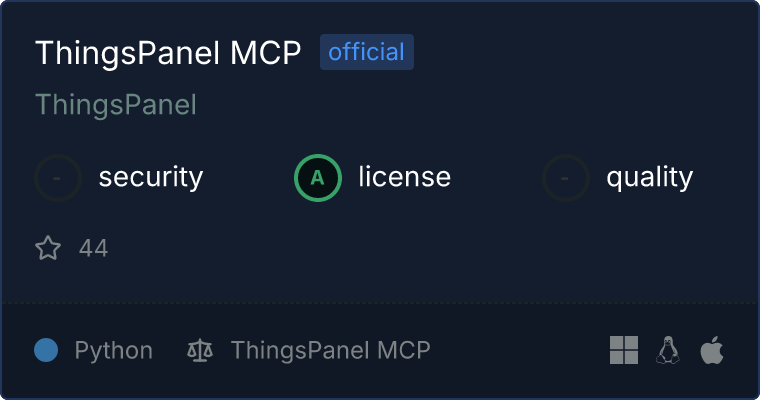ThingsPanel MCP 



ThingsPanel IoT Platform's MCP (Model Context Protocol) Server.
English | 中文
🚀 Project Overview
ThingsPanel MCP Server is an innovative intelligent interface that enables you to:
- Interact with IoT devices using natural language
- Easily retrieve device information
- Monitor device performance and status in real-time
- Simplify device control commands
- Analyze platform-wide statistical data and trends
Target Audience
Intended Users
- IoT Solution Developers: Engineers and developers building solutions on the ThingsPanel IoT platform and seeking AI integration capabilities
- AI Integration Experts: Professionals looking to connect AI models with IoT systems
- System Administrators: IT personnel managing IoT infrastructure and wanting to enable AI-driven analysis and control
- Product Teams: Teams building products that combine IoT and AI functionality
Problems Addressed
- Integration Complexity: Eliminates the need to create custom integrations between AI models and IoT platforms
- Standardized Access: Provides a consistent interface for AI models to interact with IoT data and devices
- Security Control: Manages authentication and authorization for AI access to IoT systems
- Lowered Technical Barriers: Reduces technical obstacles to adding AI capabilities to existing IoT deployments
Ideal Application Scenarios
- Natural Language IoT Control: Enable users to control devices through AI assistants using natural language
- Intelligent Data Analysis: Allow AI models to access and analyze IoT sensor data for insights
- Anomaly Detection: Connect AI models to device data streams for real-time anomaly detection
- Predictive Maintenance: Enable AI-driven predictive maintenance by providing device history access
- Automated Reporting: Create systems that can generate IoT data reports and visualizations on demand
- Operational Optimization: Use AI to optimize device operations based on historical patterns
✨ Core Features
- 🗣️ Natural Language Querying
- 📊 Comprehensive Device Insights
- 🌡️ Real-time Telemetry Data
- 🎮 Convenient Device Control
- 📈 Platform-wide Analytics
🛠️ Prerequisites
- Python 3.8+
- ThingsPanel Account
- ThingsPanel API Key
📦 Installation
Option 1: Pip Installation
pip install thingspanel-mcp
Option 2: Source Code Installation
# Clone the repository
git clone https://github.com/ThingsPanel/thingspanel-mcp.git
# Navigate to project directory
cd thingspanel-mcp
# Install the project
pip install -e .
🔐 Configuration
Configuration Methods (Choose One)
Method 1: Direct Command Line Configuration (Recommended)
thingspanel-mcp --api-key "Your API Key" --base-url "Your ThingsPanel Base URL"
Method 2: Environment Variable Configuration
If you want to avoid repeated input, set environment variables:
# Add to ~/.bashrc, ~/.zshrc, or corresponding shell config file
export THINGSPANEL_API_KEY="Your API Key"
export THINGSPANEL_BASE_URL="Your ThingsPanel Base URL"
# Then run
source ~/.bashrc # or source ~/.zshrc
💡 Tips:
- API keys are typically obtained from the API KEY management in the ThingsPanel platform
- Base URL refers to your ThingsPanel platform address, e.g.,
http://demo.thingspanel.cn/
- Command-line configuration is recommended to protect sensitive information
🖥️ Claude Desktop Integration
Add the following to your Claude desktop configuration file (claude_desktop_config.json):
{
"mcpServers": {
"thingspanel": {
"command": "thingspanel-mcp",
"args": [
"--api-key", "Your API Key",
"--base-url", "Your Base URL"
]
}
}
}
🤔 Interaction Examples
Using the ThingsPanel MCP Server, you can now make natural language queries such as:
- "What is the current temperature of my sensor?"
- "List all active devices"
- "Turn on the automatic sprinkler system"
- "Show device activity for the last 24 hours"
🛡️ Security
- Secure credential management
- Uses ThingsPanel official API
- Supports token-based authentication
License
Apache License 2.0
🌟 Support Us
If this project helps you, please give us a star on GitHub! ⭐

